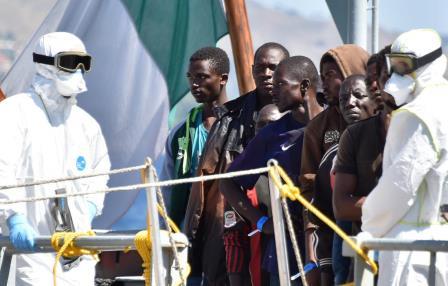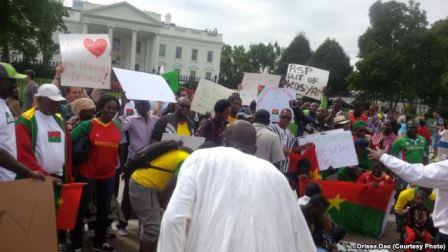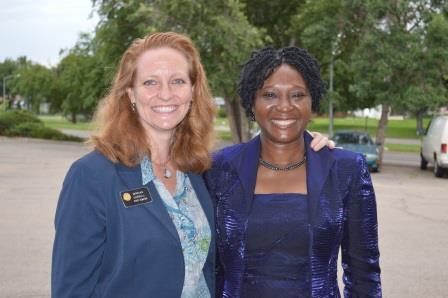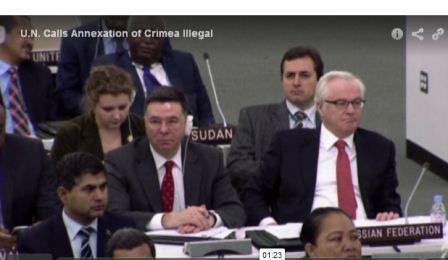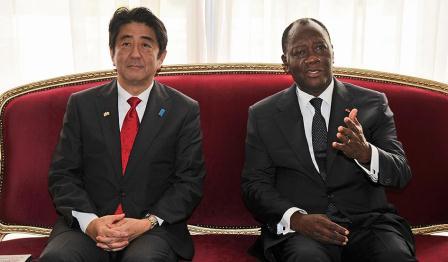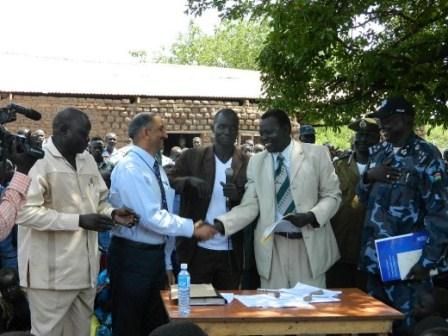Captain Phillips, Lost Boys Highlight ‘Danger of a Single African Story’
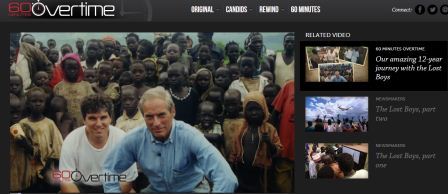
Adichie, 36, rocketed to the top of the world literary charts after the debut of the fictional novel “Purple Hibiscus” in 2003. Then she released “Half of a Yellow Sun” in 2006, “The Thing Around Your Neck” in 2009, and “Americanah” in 2013. The smart and educated classes around the world are paying attention. They have read her works, and the invitations for her to come to speak and requests for interviews keep coming.
The Nigerian author and speaker has given countless speeches and other lectures, and she has received prestigious honors and accolades for her work, including an honorary doctorate in 2009 from Kalamazoo College. She continues to fascinate many in the academic world.
Writing about “Americah” in June 2003, Mike Peed of the New York Times said Adichie “is an extraordinarily self-aware thinker and writer, possessing the ability to lambaste society without sneering or patronizing or polemicizing.”
So I have been asking why many are paying so much attention to the things she writes about and says? What is this danger of a single story she talks about, and what correlations does this bear to the persistent, sometimes varying perceptions of Africa in the news? This continues to strike my imagination.
The more I think about it, the more the movie “Captain Phillips” and the recent narrations by CBS 60 Minutes of the story of the “Lost Boys of Sudan” come to mind.
But the thing that has brought Adiche fame and recognition is not that she is a talented Nigerian author and speaker. It is that superstars like Beyoncé are singing about her. It is also that she has a unique, significant viewpoint to offer to the world in this day and age on the conspicuous challenges the African continent faces.
One of those challenges is what Adichie defines as the “single story.” a one-sided paranoia of Africa; that the place is “a basket case,” in need of help, assistance, and support all the time.
In the larger context of contemporary African thought, the equation can be drawn to the incessant mischaracterization, stereotyping, and labeling of the continent — especially sub-Saharan Africa — as corrupt, mismanaged, undemocratic, and full of dictators who have caused wars and plundered the continent’s resources for their own benefit.
This sort of demonization is largely driven by mainstream U.S. media as well as Hollywood. And we see that happening every day.
Just like many Mexicans have discovered the need to tell their own stories, many Africans now recognize this need and want to do something about it. But what Adichie has done is not just recognizing the inherent danger and bringing it to the fore, her new-found status has made the issue go mainstream. It has caught on, and plenty of people are getting involved and fighting back in their own way.
The Adichie generation of Africans sees things from a different mirror.
But long before she took on this issue in that consequential 2009 Ted Talk, there were the precursors and forerunners to Adichie, such as Charlayne Hunter-Gault, who sought to dispel myths about the continent in “New News out of Africa: Uncovering Africa’s Renaissance,” published in 2006. Hunter-Gault reminded us, that the old news about Africa, mostly shaped by local U.S. media, continues to be about the “three Ds” – death, disease, and despair – for the continent, which she says is underpinned with mostly headline news about wars, refugees and chaos linked to Africa.
Others included the IMF and World Bank, whose reports over a decade ago depicted progress and change in the continent.
Adichie knows the dangers of a single, “incomplete” African narrative too well.
“And I must quickly add that I too am just as guilty on the question of a single African story,” she told her Ted audience. The problem, she explains, is not that the stories are not true, but that they are incomplete. They lacked balance.
As a public persona, Adichie may, inadvertently, be the representation of a new generation of Africans who beg to disagree with the way things are. This new generation wants to write and speak about Africa in new ways, boldly, and to be heard as well. But that did not come easily, she tells us.
As a young child, she spent a lot of time reading American and British authors. But there were unintended consequences in doing that. Her view of the world, stories of snow in the west, the weather, the apples that grew there, was shaped by what she read in mostly Western books.
But before she discovered African books as a young person, “I wrote exactly the kinds of stories I was obligated to read,” she explains.
In those days there were not a lot of African books readily available, but there were plenty of books about Europe and America. That’s all she read. What this demonstrated to her is “how impressionable and vulnerable we are in the face of a story, particularly as children.”
But something happened along the way, and “things changed when I discovered African books,” Adichie said.
You can say her entire world and narrative changed as well. She went through a “mental shift.”
The Adichie generation of Africans doesn’t see the continent the way Hollywood and U.S. media see it. A lot of them are not only reading Rowling, Tennyson, Chaucer, and Yates anymore. They are watching and reading Adichie’s works, and they are balancing that with the works of Alicia Keys, Maya Angelou, and T.D Jakes.
You can say today’s generation of young Africans have a view and perspective of Africa that is different from the views of Africa narrated through 60 Minutes and Captain Phillips.
Hollywood and the U.S. media empire are producing exactly the kind of movies and news stories about Africa that America is obligated to watch, but we don’t have to buy it. How “impressionable and vulnerable” are we about Africa when we are exposed to single stories about wars, refugees, pirates, and other atrocities emanating from the continent?
Even more compelling is how the speaker weaves in subtlety, contrast, juxtapositions and analogy to explain her dilemmas, circumstances and frustrations with the African past.
In contrasting her own bias, Adichie picks lessons from her own experience, her American college roommate who she said felt so much pity for her before she realized that Adichie knew how to use a stove and listened to the music of Maria Carey. “Her default position toward me as an African was a kind of patronizing well-meaning pity,” she says.
Then there is the story about her neighbors in Nigeria while she was growing up. The family included their housemaid, a boy called Fide. Before she discovered the whole story about them, all she knew was that they were very poor. That poverty was signified in the leftovers and other handouts her family provided them.
But the curious storyteller discovered a different truth.
She was “startled,” she says when she saw a beautifully patterned basket that Fide’s brother had made. “It had not occurred to me that anybody in his family could actually make something. All I had heard was how poor they were. So, it had become impossible for me to see them as anything but poor. Their poverty was my single story of them,” she says.
In other words, Adichie’s view of the world was fragmented until she looked for something new and different about the poor people next door. The symbolism in this could be a hallmark of her writing and speaking.
Have we “felt sorry” for the African continent before we discovered it?
In a Washington Post op-ed piece in 2006, she stated: “It is easy to romanticize poverty, to see poor people as inherently lacking agency and will. It is easy to strip them of human dignity, to reduce them to objects of pity. This has never been clearer than in the view of Africa from the American media, in which we are shown poverty and conflicts without any context.”
In most U.S. news broadcasts and movies about Africa, the danger of a single African narrative remains pervasive. They lurk in the background. You can name them: Hotel Rwanda, The Last King of Scotland and others.
But let’s look at the oddities with the recent 60 Minutes segment about the “Lost Boys of Sudan,” as well as the dubiousness in America’s fascination with the movie “Captain Phillips.”
While many questions abound about the accuracies of the movie, undoubtedly the heroism involved the movie is praise worthy. But how accurate is the story, and how balanced would it have been when told by Somalis whose ‘territorial sovereignty’ is being violated. The question others have posed is ‘whether the real story was framed by Western media.’
Writing about Captain Phillips for USA Today, Brian Klaas and Jamal Abdulahi, question the media’s focus on Piracy in Somalia when, ‘there were no hijackings off the coast of Somalia in 2013. None”
While there are still issues to deal with in Somalia, the writers contend that, ‘Somalia pirates are a dying breed. The scourge is now largely eradicated from the Horn of Africa, thanks to a multilateral fleet. Protecting ships is easy. Protecting Somalis from anarchy — and protecting the world from the deadly byproducts of that anarchy — is hard.”
On the other hand, the “Lost Boys of Sudan” story may have scored huge ratings for CBS News, but the segment is just a one-sided narrative of contemporary African issues, and a ratings bonanza for CBS News. The original segment aired in July 2013, and re-aired on Jan. 19, right after the AFC Championship game in which the Denver Broncos won. There may have been other airings, but what a great moment to show the world all that bedevils Africa.
For sure, the story of the lost boys and the history of Sudan is an important story that needs to be told. The heroic rescue of the boys, the suffering they endured in the process and their eventual resettlement in America is something that needs praise. Who won’t give thanks to the U.S. for that? But haven’t we heard and seen enough already about the problems in South Sudan.
What the 60 Minutes segment did not tell us is, what can be done to prevent another war in South Sudan.
Does every major story about sub-Saharan Africa on in the news have to be about war, when there are plenty of positive things taking place there? And where does the rest of the continent fit in in the larger narrative?
This leads to the question of impressions, which African news, produced by U.S. organizations, continues to create for the continent. In the case of South Sudan, the impressions continue to portray a place still embroiled in civil strife, resulting in death, pain, and suffering.
One context of the Sudan story, as told by correspondent Bob Simon, is a country that was entangled in the civil war in the 1980s and 1990s and which displaced many. The refugees from Sudan escaped the brutality and fighting on foot, with many settling in refugee camps in neighboring Kenya.
“The Lost Boys couldn’t go home to Sudan and Kenya didn’t want them. Then, in 2000, the State Department decided they deserved a break and invited them to come to live in the United States,” we are told by CBS.
The other context of the story, the one 60 Minutes left out, is the recent fighting in the country, a struggle whose impact bears even more negative perceptions for the continent, even against glimmers of hope that South Sudan was on the right path toward development.
Writing on his blog, Africa in Transitions, John Campbell, a senior fellow for Africa Policy Studies at the U.S. Council on Foreign Relations, states: “On so many grounds the fighting in South Sudan has been a disaster. But, one is the negative impact it likely will have on how some (or many) Americans regard Africa. Africa is usually far from American concerns, except in specialist circles.”
Writing about “The End of the South Sudan Dream,” Campbell states: “The lost boys of Sudan–orphaned by Khartoum’s brutality–were a cause taken up by parishes and congregations across the United States and encouraged by Hollywood figures such as George Clooney and human rights activists. South Sudan’s achievement of independence in 2012 was popularly welcomed in the United States, though with little appreciation of the obstacles still to be overcome.”
“It is impossible to talk about a single story without talking about power,” Adichie cautions. The power she references rests in the hands of news media executives who decide what can be dramatized for economic and political gain. In this case, “showing a people as one thing, only one thing, over and over again and that is what they become.”
It is true. Africa is what the media dramatizes. We see that in Captain Phillips and the Lost Boys’ story. But the ‘gatekeepers’ and other barriers that have impeded the flow of contrary views about Africa, are being broken down, one impediment at a time, by a new generation of Africans.


